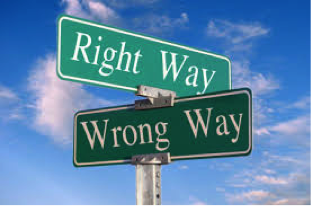A CONSCIENCE OR MORAL SENSE
Where did our conscience come from? Why do we all think some things are right and some are wrong?
Every day, perhaps several times a day, we make decisions about right and wrong. Where did that moral sense come from?
For centuries, universities taught that:
• moral values arise from the nature of God and
• moral duties come from the commands of God.
With that in mind, let’s take a look at the moral argument for the existence of God. It’s pretty simple.
THE MORAL ARGUMENT FOR GOD
1. If God does not exist, objective moral values and duties do not exist.
2. Objective moral values and duties exist.
Conclusion: Therefore, God exists.
Now, if that convinces you that God exists, you don’t need to read further. However, if you want to see the very best attacks against this argument and our responses, read the next few lessons. In those lessons, we will discuss two common attacks on premise 1 and two that are commonly raised about premise 2. You will also see why we believe the moral argument makes a sound case that God actually does exist.
CAN WE BE GOOD WITHOUT GOD?

Keira Knightley:
“If only I wasn’t an atheist. I could get away with anything. You’d just ask for forgiveness, and then you’d be forgiven.”

Actress Nigella Lawson:
“I was brought up an atheist and have always remained so,” she told The Times. “But at no time was I led to believe that morality was unimportant.”

Actress Katharine Hepburn:
“I’m an atheist, and that’s it. I believe there’s nothing we can know except that we should be kind to each other and do what we can for each other.”
So can we be good without God? It’s easy to confuse these two questions:
1. This is NOT the question: “Can we be good without BELIEF in God?”
2. We are asking this specific question: “Can we be good without the EXISTENCE of God?”
ATHEISTS’ REACTION TO THE MORAL ARGUMENT
Here are three questions that our atheist friends will typically ask at this point:
1. “Are you saying that atheists are bad people? ” No, we’re not saying that.
2. “Are you saying I have to believe in God in order to lead a good and decent life?” No.
3. “Are you suggesting that I have to believe in God in order to recognize there are objective moral values?” No, we’re not saying that either. You can be an atheist and acknowledge that there is objective morality. Some atheists recognize this fact; others do not.
Christians believe that there’s an innate moral sense in every person that helps them discern right from wrong.
There are many good atheists who have a strong personal morality and who live their lives according to those principles.
The question is, “Where does that moral sense come from?”
Premise 1 of the moral argument is making this very specific and narrowly-focused point: “If God does not exist, objective moral values and duties do not exist.” We’re not talking about belief in God, but rather God’s existence.
ATHEISM’S THREE DIFFERENT PERSPECTIVES ON MORALITY
On the subject of morality, atheism is not a monolith. It’s basically divided into three different views:
1. naturalism,
2. atheistic moral platonism and
3. moral relativism,
each of which disagrees with one another on the subject of morality.

1. “Naturalism” is a type of atheism that says:
“Moral values and duties don’t exist. They’re an illusion because science can’t observe them. They’re something we make up so that we don’t kill each other and cultures can survive. But humans’ morals are no better than the morality of any other species.”
According to surveys, many scientists are naturalists. This view runs counter to premise 1 of the moral argument, which says, “If God does not exist, objective moral values and duties do not exist.”

2. “Atheistic moral platonism” is a type of atheism that says:
“Objective moral values and duties actually do exist, but independently of any God.”
According to surveys, most philosophy professors are atheistic moral platonists. This view also contradicts premise 1 of the moral argument, which says, “If God does not exist, objective moral values and duties do not exist.”
This is the position that actresses Keira Knightley, Nigella Lawson and Katharine Hepburn took regarding their atheistic views in the quotes cited above: the simultaneous inexistence of God but existence of objective moral values.

3. “Moral relativism” is a type of atheism that says:
“Morals exist, but they’re entirely subjective (can vary by culture and by individual). No culture’s morality or individual’s morality is any better than another’s.”
According to surveys, most college students believe this. This view runs directly counter to premise 2 of the moral argument which says, “Objective moral values and duties exist.”
QUESTIONS
So those are the three ways that atheism looks at morality. This raises three questions:
1. Is it true that morals don’t exist and are just an illusion?
2. Is it possible for abstract moral values to exist independent of a person or moral lawgiver?
3. If the morals of one culture contradict another’s, is it possible for them both to be just as correct and just as relevant?


One Comment on “Moral Argument (Part 1): What Does Atheism Say About Morality?”
GREAT JOB!!!
Content is EXCELLENT so far!!!